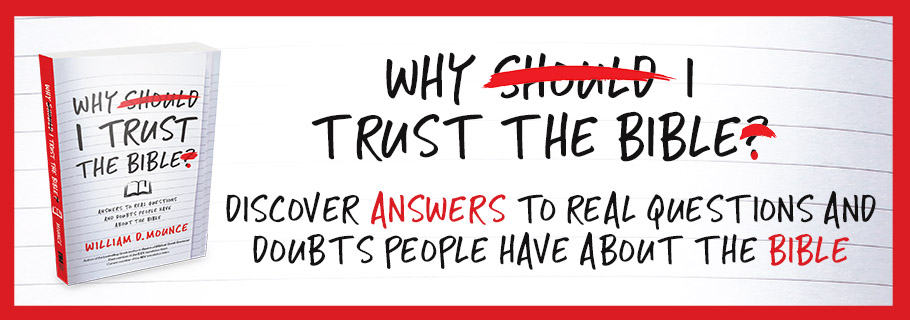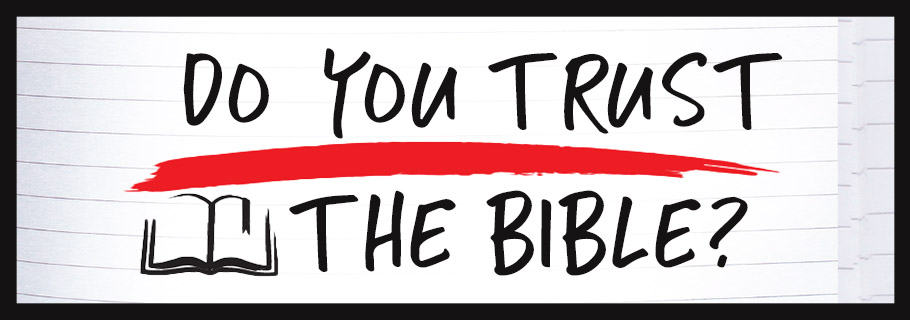Today’s post is written by Bill Mounce and is sponsored by Zondervan. Bill is the author of Why I Trust the Bible and Basics of Biblical Greek.
The Bible makes some astonishing claims about itself. The apostle Paul tells his friend Timothy that every word of the Bible comes from the mouth of God (2 Tim 3:16). The Bible says God personally wrote the Ten Commandments with His own finger (Exod 31:18; Deut 9:10). Almost five hundred times, the prophets preface their prophecies with the claim “says the Lord.” Jesus says, “I did not speak on my own, but the Father who sent me commanded me to say all that I have spoken” (John 12:49). Under normal circumstances, if someone says they speak for God, I doubt many of us would pay attention. But this is exactly what the Bible says about itself. Do you believe it?
We can no longer assume that people trust their Bible and believe what it says about itself. Western culture has shifted away from its Judeo-Christian heritage, and the popular media has launched such an attack on the believability of Scripture that many churchgoers have serious questions about the Bible. Questions like:
- Did Jesus actually live?
- Did the biblical writers get it right, or did they slant, massage, or even create the Bible we have today?
- The Gospels were written long after Jesus lived; how can you trust them?
- How can you believe a Bible that’s full of internal contradictions with itself and external contradictions with science and history?
- Why should we believe the right books are in the Bible? Many books were left out, like the Gospel of Thomas.
- Why trust the Bible when there are so many contradictory translations?
Wherever I travel in the world, whether I am speaking at conferences or universities or churches, there is one burning question. Can I trust the Bible? Why should I trust the Bible? Gone are the days of the veneer of a Christian culture where trust was assumed. Gone are the days when the Bible was given the benefit of the doubt. We live in a culture that aggressively attacks the Bible and those who were raised to trust it. University freshman are being challenged in every class. Parents often do not know what to do or how to help.
Some people feel it’s wrong to ask these fundamental questions; but if you never seriously ask them, you’ll never be convinced that the Bible is true and trustworthy. So I invite you to ask the hard questions, read the controversies and solutions, and decide for yourself whether you trust your Bible. Does it contain the very words of God?
I wrote the book, Why I Trust the Bible because people need to know the challenges of the day and the solutions to the questions raised. As is true of all systems of belief that deal with the ultimate questions of reality—Christianity, Islam, Materialism, Atheism—we all must have faith. I can’t prove the Bible is trustworthy, but I don’t have to put my brain on the shelf in order to believe in its trustworthiness. There are good answers to the hard questions being asked today, and none of the questions need to drive anyone to despair.
After forty-nine years of consistent and serious study of the New Testament, I am more convinced than ever that the Bible contains the very words of God and is wholly trustworthy.
This post is adapted from the Preface of Bill Mounce’s book Why I Trust the Bible. Order the book or find out more info.

Bill Mounce (PhD, Aberdeen University) lives as a writer in Washougal, Washington. He is the President of BiblicalTraining.org, a non-profit organization offering world-class educational resources for discipleship in the local church. See www.BillMounce.com for more information. Formerly he was a preaching pastor, and prior to that a professor of New Testament and director of the Greek Program at Gordon-Conwell Theological Seminary. He is the author of the bestselling Greek textbook, Basics of Biblical Greek, and many other resources. He was the New Testament chair of the English Standard Version translation of the Bible and is serving on the NIV translation committee.
What people are saying about Why I Trust the Bible:
“Bill Mounce has produced a remarkably clear, comprehensive, and level-headed resource that carefully and graciously explains each type of objection that has been lodged against the Bible, and then answers each objection with convincing facts and arguments. I expect that all who read it will gain deeper confidence in the trustworthiness of the Bible.”
—WAYNE GRUDEM, Phoenix Seminary
“Ordinary believers wonder whether the Bible is really true, whether we can truly trust the Scriptures. Why I Trust the Bible represents a learned and accessible response to such questions. Many, I believe, will be assured in their faith by reading this important book.”
—THOMAS R. SCHREINER, The Southern Baptist Theological Seminary
“We live in a time when truth is subject to a person’s preferences and what is called ‘truth’ is really just formulated montage of misinformation. We need accessible and accurate information for people from all walks of life. In Why I Trust the Bible, Bill Mounce invites Christ-followers and doubters to consider the reasonable and sound answers he provides to today’s tough questions.
—ERIC MASON, Epiphany Fellowship
“This excellent volume is a treasure trove of explanations of difficult texts and answers to skeptics’ questions about the Bible. With each chapter, I found my confidence in the integrity of the biblical text reaffirmed and strengthened. Bill Mounce is uniquely qualified to respond to the many arguments against the authority and trustworthiness of the Bible, and I highly commend this book to anyone who is struggling to believe that Scripture is genuinely God-breathed.”
—SAM STORMS, Bridgeway Church
Go here to order Why I Trust the Bible or find out more info.










